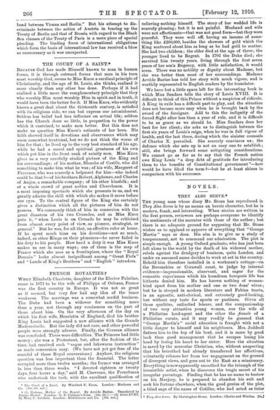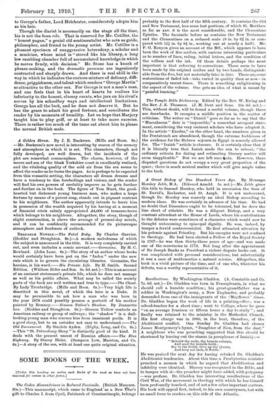NOVELS.
'ilik,Y ALSO SERVE.* THE young man whose diary Mr. Stone has reproduced in They Also Serve is by no means an heroic character, but he is modern, frank, and interesting. When stories are written in the first person, reviewers are perhaps overprone to identify the sentiments of the narrator with those of the author ; but there is no adequate ground for supposing that Mr. Stone wishes us to applaud or approve of everything that "George Martin " says or does. His aim is to give us a study of temperament, not to command our admiration. The plot is simple enough. A young Oxford graduate, who has just been left alone in the world by the death of his widowed mother, rebels against the drudgery of business, quits London, and under an assumed name decides to work at art in the country. Behold him therefore installed in a workman's cottage—on the Devonshire or Cornwall coast, to judge by internal evidence—impressionable, observant, and eager for the romantic experiences which his humdrum bourgeois life has hitherto denied him. He has known nothing of woman- kind apart from his mother and one or two dons' wives ; but he is steeped in modern literature and Fabian tracts, is an agnostic, anti-clerical, and extremely good-looking, but without any taste for sports or pastimes. Given all these qualities, unlimited leisure, and the companionship of two very attractive young women, one the wife of a Philistine land-agent and the other the fiancee of a Philistine curate, and it may readily be guessed that "George Martin's" social education is fraught with not a little danger to himself and his neighbours. Mrs. Joddrell flatters him to the top of his bent, and it is more by good luck than good management that he escapes losing his head by losing his heart to her sister. Here the situation is saved by the muscular Christian, who, without suspecting that his betrothed had already transferred her affections, voluntarily releases her from her engagement on the ground of divergent views, and goes out to the East as a missionary. Everything is now apparently smoothed for the triumph of the irresistible artist, when he discovers the tragic secret of his irregular parentage. Finding that he has no name to bestow on his Marjory, he is prepared to abandon his suit and seek his fortune elsewhere, when the good genius of the plot, a blind sage of the name of Cotiller, who had acted as tutor They Also Serve. By Christopher Stone. London : Chatto and Windus. [Os.]
to George's father, Lord Hekhester, considerately adopts him as his heir.
Though the diarist is necessarily on the stage all the time, his is not the beau role. That is reserved for Mr. Cotiller, the " honest pagan," a genial old sentimentalist who acts as guide, philosopher, and friend to the young artist. Mr. Cotiller is a pleasant specimen of unaggressive heterodoxy, a scholar and a musician, whose mind is " stored like his library, a long low rambling chamber full of accumulated knowledge in which be moves firmly, with decision." Mr. Stone has a knack of phrase-making, and the dramatis personae are ingeniously contrasted and sharply drawn. And there is real skill in the way in which he indicates the curious mixture of delicacy, diffi- dence, priggishness, and talent which renders " George Martin" so attractive to the other sex. For George is not a man's man, and one feels that in his heart of hearts he realises his inferiority to the honest, clumsy curate, who jars on his rival's nerves by his schoolboy ways and intellectual limitations. George has all the luck, and he does not deserve it. But he has the grace to admit his good fortune, and conciliates the reader by his moments of humility. Let us hope that Marjory taught him to play golf, or at least to take more exercise. There is rather too much of the tame cat about him to please the normal British male.











































 Previous page
Previous page